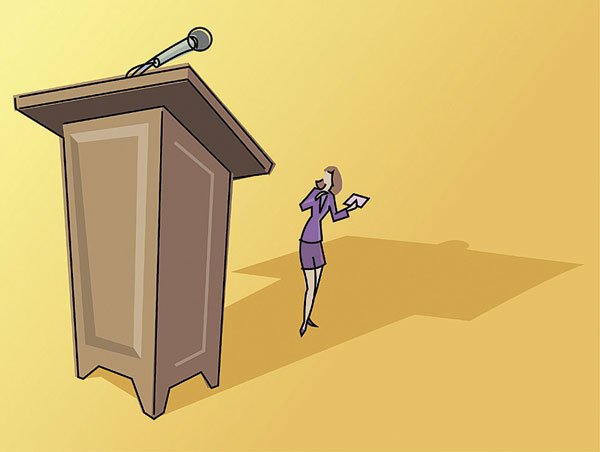Harry Albert stands at the lectern, eyes focused on his pen.
He’s a portly man with round glasses and a grandfatherly face, a
voice whose cadence immediately brings to mind William Shatner and
who ends his nervous stutter of um’s, uh’s and ah’s with
”
ubadah ubadah, that’s all folks.
”
Harry Albert stands at the lectern, eyes focused on his pen. He’s a portly man with round glasses and a grandfatherly face, a voice whose cadence immediately brings to mind William Shatner and who ends his nervous stutter of um’s, uh’s and ah’s with “ubadah ubadah, that’s all folks.”
This morning he’s addressing nearly 20 people in an accountant’s office, discussing the role of quality – what it is and how we get it. He’ not a motivational speaker or a company executive. He’s a member of Toastmasters International, a public speaking group of 190,000 members honing their craft in more than 70 countries.
In the United States, public speaking is people’s number one fear, followed by death. Getting up in front of a microphone, it seems, is worse than imagining the great hereafter, yet Toastmasters International continues to enroll nearly 250 new members per day. They’re everywhere, from individual teams that compete within Cisco’s corporate structure to groups that meet in the United States Senate and House of Representatives. Could paying to give a speech (even if it is only $25 per year) really be the new bungee jumping?
This icy Thursday morning brings an eclectic mix to the meeting in Morgan Hill – a county manager who is learning to discover her subtle wit, an ergonomic assessment specialist who owes her job to the program, an publicly outspoken but inwardly nervous writer – to practice not only the art and craft of public speaking, but to do so in a non-threatening environment.
The group offers participants the chance to choose their level of involvement.
Eight speeches will take them from the level of novice to Competent Toast Master.
Members are welcome to stay, working their way up in the ranks of leadership ability and speaking experience, but many leave when they feel the program has helped them to accomplish their goal of comfortably talking in work meetings.
“A lot of people end up coming back because they see their skills start to recede,” said Phil Robinett. He’s the club’s sergeant at arms and has been part of Toastmasters for four years. He is also the accountant whose office currently hosts the chapter’s weekly 7:30am meeting. “It’s amazing how much goes away if you’re not using it all the time.”
Speakers are given a booklet of guidelines to help shape their speech along with a central theme such as “use of a prop,” “variation of tone,” or “inspirational speech.” From there it is up to them to choose a topic and craft their own talk for the group.
“You do it in front of friends,” Robinett said. “You do it where it’s not going to affect your career or embarrass you in a large, public way.
“The exclusive purpose and mission is the speaker themselves, so you get to decide what to do, whether it’s learn to speak in public or just learn to hone the skills you already have.”
When Nancy Lowe first joined the group, she recalls she was petrified of speaking to an audience.
“I’m the main ergonomic specialist at Kaiser Santa Teresa and the position was created at my request in 2001,” said Lowe. “I was going to have to do a lot of teaching, and I thought I might need to convince some patients that this was for them, so I decided to join. But I would just get really nervous.”
Lowe’s hands would shake and she would forget her words when put on the spot. Notes were always necessary for her to convey information, and the two words she associated with public speaking were “scary” and “bad.”
“I still get nervous and my hands still shake sometimes,” said Lowe, now a four-year veteran of the program, “but the feeling I have is one of excitement. I get sort of a rush from standing up and talking to people, and I can be confident delivering a report to a big room of doctors or staff.”
Nellie Jorge, a manager for Santa Clara County, has also found a confidence beginning to enter her voice. She joined the group 18 months ago and has already noticed a change in herself professionally.
“It helps me to respond and also to stay more focused on things when I’m talking to people,” said Jorge.
Albert, who is already comfortable during conversations because of his job as a real estate agent at Century 21 in Hollister, has grander ideas about what he hopes for from Toastmasters.
“I’m at a point in my life that I’m pretty close to being able to do any damn thing that I want,” said the retired Hewlett-Packard Company employee. “I would like to do a public speech some day, just for the hell of it.”
The nearest meeting may not be so near. Morgan Hill’s meeting is the only Toastmasters group between San Jose and Salinas.
If you’re interested in sitting in on one of their meetings, call Nancy at (408) 778-0629. For more general information on the organization, visit the Toastmasters International Web site at www.toastmasters.org.
Tips for successful public speaking
1 . Know the room. Be familiar with the place in which you will speak. Arrive early, walk around the speaking area and practice using the microphone and any visual aids.
2 . Know the audience. Greet some of the audience as they arrive. It’s easier to speak to a group of friends than to a group of strangers.
3 . Know your material. If you’re not familiar with your material or are uncomfortable with it, your nervousness will increase. Practice your speech and revise it if necessary.
4. Relax. Ease tension by doing exercises .
5 . Visualize yourself giving your speech. Imagine yourself speaking, your voice loud, clear and assured. When you visualize yourself as successful, you will be successful .
6 . Realize that people want you to succeed. Audiences want you to be interesting, stimulating, informative and entertaining. They don’t want you to fail.
7. Don’t apologize. If you mention your nervousness or apologize for any problems you think you have with your speech, you may be calling the audience’s attention to something they hadn’t noticed. Keep silent.
8 . Concentrate on the message not the medium. Focus your attention away from your own anxieties and outwardly toward your message and your audience. Your nervousness will dissipate.
9 . Turn nervousness into positive energy. Harness your nervous energy and transform it into vitality and enthusiasm.
10 . Gain experience. Experience builds confidence, which is the key to effective speaking. A Toastmasters club can provide the experience you need.
– Toastmasters.org













